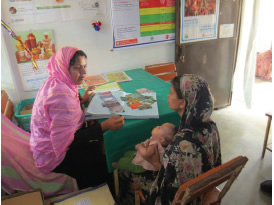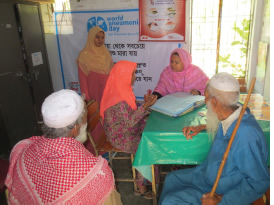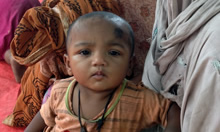Health care providers making a difference in their communities

Jesmin is a community health care provider at the Krisnakathi Community Clinic in Bakergonj upazila (a subdistrict administrative unit) of the Barisal Division located in the southern delta region of Bangladesh. Jesmin provides general health care services to patients of all ages, including pregnant and lactating women. She received some on-the-job training in primary treatment and medicine. However, this training did not prepare her to counsel new mothers, especially those who are lactating, on topics such as when and what to feed their infants or concerns that their infants were not receiving enough milk. Without the proper training, Jesmin felt she could not provide the correct information. “The topic...is so common and familiar in our lives, but we did not know the right information,” she recalled.
This training was quite different ... The most effective thing for me was the counseling technique, which is very relevant to my job.
- Jesmin
Proper infant feeding is a global concern and requires investments at the country level to address and improve infant feeding. Chronic malnutrition can result in a child failing to achieve full growth and cognitive potential, and evidence suggests that negative health outcomes continue throughout life. In Barisal, the median duration of exclusive breastfeeding is 2.3 months (well below the universal recommendation of six months), and nearly half (45%) of children under age five have stunted growth.1
To help address malnutrition in Bangladesh, the Strengthening Partnerships, Results and Innovations in Nutrition Globally Project (SPRING), funded by the U.S. Agency for International Development (USAID), trains health workers in the Ministry of Health and Family Welfare on Essential Nutrition and Hygiene Actions (ENHA).2 The goal of ENHA training is to help frontline health workers develop the confidence and capacity to counsel households with pregnant and lactating women and children under age two on nutrition and hygiene at a variety of contact points, from community clinics to home visits.

The ENHA training showed Jesmin how to effectively counsel pregnant and lactating women on improving their nutritional status through small, easily accomplishable but essential steps to enhance the health of both baby and mother. The ENHA curriculum specifically incorporates information that covers how to breastfeed properly, when to introduce complementary feeding, how to feed young children, what pregnant and lactating women should eat, and a basic understanding of household dietary diversity and hygiene.
“This training was quite different than other trainings that I received earlier,” Jesmin said. “The most effective thing for me was the counseling technique, which is very relevant to my job.”
Since her training, Jesmin now provides detailed counseling for pregnant and lactating mothers; she can steer them toward appropriate nutritional decisions and provide advice on micronutrients, as needed. She also encourages community members to use the “tippy tap”, a simple handwashing device that increases the availability of clean water for handwashing around the household.
Jesmin has established herself as an effective counselor in her community. As a result, more pregnant and lactating women come to her clinic, seeking her consultation in particular.
“I highly appreciated this training, which [has] made me a [more confident] health care provider for my community,” Jesmin said.
Training Fast Facts
- Direct (cascade) trainings of frontline health workers last four days. Classes typically have between 18 and 24 students.
- In its first two years, SPRING/Bangladesh trained 4,249 frontline health workers who have since made 666,072 contacts through their counseling sessions.
- SPRING/Bangladesh successfully trained all frontline health and agriculture workers within the targeted 40 upazilas. Supervisory-level health workers were trained as master trainers.
- This year, SPRING/Bangladesh will focus on solidifying these efforts through targeted refresher trainings and supportive supervision visits to strengthen trainer capacity and improve sustainability of the interventions.
1 National Institute of Population Research and Training (NIPORT), Mitra and Associates, and ICF International. 2013. Bangladesh Demographic and Health Survey 2011. Dhaka, Bangladesh and Calverton, Maryland, USA: NIPORT, Mitra and Associates, and ICF International.
2 Executive Summary. The Lancet 2013; 382 (9859), 1-12.
